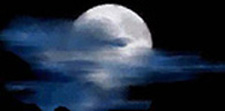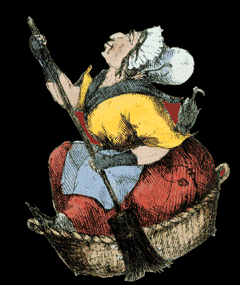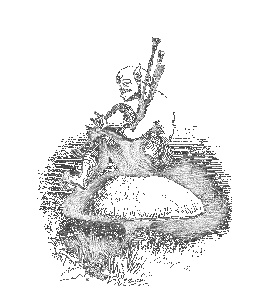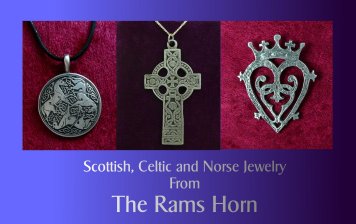The Witch of Fife
by James Hogg


“Where have ye been, ye ill woman,
These three lang nights frae hame?
What gars the sweat drap frae yer brow,
Like drops o’ the saut sea-faem?
“It fears me muckle ye have seen
What gude man never knew;
It fears me muckle ye have been,
Where the gray cock never crew.
“But the spell may crack, and the bridle break,
Then sharp yer word will be;
Ye had better sleep in yer bed at hame,
Wi’ yer dear little bairns and me.”
“Sit dune, sit dune, my leal auld man,
Sit dune, and listen to me;
I’ll gar the hair stand on yer crown,
And the cauld sweat blind yer e’e.
“But tell nae words, my gude auld man,
Tell never a word again;
Or dear shall be your courtesy,
And driche and sair yer pain.
“The first leet night, when the new moon set,
When all was douffe and mirk,
We saddled our nags wi’ the moonfern leaf,
And rode frae the Kilmerrin kirk.
“Some horses were of the brume-cow framed,
And some of the green bay tree;
But mine was made of ane hemlock shaw,
And a stout stallion was he.
“We raide the tod doune on the hill,
The martin on the law;
And we hunted the owlet out o’ breath,
And forced him doune to fa’.”
“What guid was that, ye ill woman?
What guid was that to thee?
Ye would better have been in yer bed at hame,
Wi’ yer dear little bairns and me.”
“And aye we rode, as sae merrily rode,
Through the merkest gloffs of the night;
And we swam the flood, and we darnit the wood,
Till we came to the Lommond height.
“And when we came to the Lommond height,
Sae lightly we lighted doune;
And we drank frae the horns that never grew,
The beer that was never browin.
“Then up there rose a wee wee man,
From neath the moss-gray stane;
His face was wan like the colliflower,
For he neither had blude nor bane.
“He set a reed-pipe till his mouth;
And he played sae bonnily,
Till the gray curlew, and the blackcock flew
To listen his melody.
“It rang sae sweet through the green Lommond,
That the night-wind lowner blew;
And it soupit alang the Loch Leven,
And wakened the white sea-mew.
“It rang sae sweet through the green Lommond,
Sae sweetly and sae shrill,
That the weasels leaped out of their mouldy holes,
And danced on the midnight hill.
“The corby crow came gledging near,
The erne gaed veering bye;
And the trouts leaped out of the Leven Loch,
Charmed with the melody.
“And aye we danced on the green Lommond,
Till the dawn on the ocean grew:
Nae wonder I was a weary wight,
When I cam hame to you.”
“What guid, what guid, my weird, weird wyfe,
What guid was that to thee?
Ye wad better have been in yer bed at hame,
Wi’ yer dear little bairns and me.”
“The second night, when the new moon set,
O’er the roaring sea we flew;
The cockle-shell our trusty bark,
Our sails of the green sea-rue.
“And the bauld winds blew, and the fire-flauchts flew,
And the sea ran to the sky;
And the thunder it growled, and the sea-dogs howled,
As we gaed scurrying bye.
“And aye we mounted the sea-green hills,
Till we brushed the clouds of heaven,
Then soused downright like the stern-shot light,
Fra the lift’s blue casement driven.
“But our tackle stood, and our bark was good,
And sae pang was our pearly prow;
When we couldna speil the brow of the waves,
We needled them through below.
“As fast as the hail, as fast as the gale,
As fast as the midnight leme,
We bored the breast of the bursting swale,
Or fluffed in the floating faem.
“And when to the Norroway shore we wan,
We mounted our steeds of the wind,
And we splashed the floode, and we darnit the wood,
And we left the shore behind.
“Fleet is the roe on the green Lommond,
And swift is the couryng grew;
The rein-deer dun can eithly run,
When the hounds and the horns pursue.
“But neither the roe, nor the reindeer dun,
The hind nor the couryng grew,
Could fly o’er mountain, moor, and dale,
As our braw steeds they flew.
“The dales were deep, and the Doffrins steep,
And we rose to the skies ee-bree:
White, white was our road that was never trode,
O’er the snows of eternity.
“And when we came to the Lapland lone,
The fairies were all in array,
For all genii of the north
Were keeping their holiday.
“The warlock men, and the weird women,
And the fays of the wood and the steep,
And the phantom hunters all were there,
And the mermaids of the deep.
“And they washed us all with the witch-water,
Distilled frae the moorland dew,
Till our beauty bloomed like the Lapland rose,
That wild in the forest grew.”
“Ye lee, ye lee, ye ill woman,
Sae loud as I hear ye lee!
For the worst-faured wyfe on the shores of Fyfe
Is comely compared wi’ thee.”
“Then the mermaids sang, and the woodlands rang,
Sae sweetly swelled the choir;
On every cliff a harp they hang,
On every tree a lyre.
“And aye they sang, and the woodlands rang,
And we drank; and we drank sae deep;
Then soft in the arms of the warlock men,
We laid us dune to sleep.”
“Away, away, ye ill woman,
An ill death might ye dee!
When ye hae proved sae false to yer God,
Ye can never prove true to me.”
“And there we learned frae the fairy folk,
And frae our master true,
The words that can bear us through the air,
And locks and bars undo.
“Last night we met at Maisry’s cot;
Right well the words we knew;
And we set a foot on the black cruick-shell,
And out at the lum we flew.
“And we flew o’er hill, and we flew o’er dale,
And we flew o’er firth and sea,
Untill we cam to merry Carlisle,
Where we lighted on the lea.
“We gaed to the vault beyond the tower,
Where we entered free as air;
And we drank, and we drank, of the bishop’s wine,
Till we could drink nae mair.”
“Gin that be true, my guid, auld wyfe,
Whilk thou hast tauld to me,
Betide my death, betide my lyfe,
I’ll bear thee company.
“Next time ye gang to merry Carlisle
To drink of the blude-red wine,
Beshrew my heart, I’ll fly with thee,
If the deil should fly behind.”
“Ah! Little ye ken, my silly auld man,
The dangers we maun dree;
Last night we drank of the bishop’s wine,
Till near near taen were we.
“Afore we wan to the sandy ford,
The gor-cocks nichering flew;
The lofty crest of Ettrick Pen
Was waved about with blue,
And, filchtering through the air, we fand
The chill chill morning dew.
“As we flew o’er the hills of Braid,
The sun rose fair and clear;
There gurly James, and his barons braw,
Were out to hunt the deer.
“Their bows they drew, their arrows flew,
And pierced the air with speed,
Till purple fell the morning dew
With witch-blude rank and red.
“Little ye ken, my silly auld man,
The dangers we maun dree;
Ne wonder I am a weary wight
When I come hame to thee.”
“But tell me the word, my gude auld wyfe,
Come tell it me speedily;
For I long to drink of the gude red wine,
And to wing the air with thee.
“Yer hellish horse I willna ride,
Nor sail the seas in the wind;
But I can flee as well as thee,
And I’ll drink till ye be blind.”
“O fy! O fy! my leal auld man,
That word I darena tell;
It would turn this warld all upside down,
And make it warse than hell.
“For all the lasses in the land
Wald mount the wind and fly;
And the men would doff their doublets syde,
And after them would ply.”
But the auld good man was a cunning auld man,
And a cunning auld man was he;
And he watched and he watched for mony a night,
The witches’ flight to see.
One night he darnit in Maisry’s cot;
The fearless hags came in;
And he heard the word of awesome weird;
And he saw their deeds of sin.
Then ane by ane, they said that word,
As fast to the fire they drew;
Then set a foot on the black cruick-shell,
And out at the lum they flew.
The auld gudeman cam frae his hole
With fear and muckle dread,
But yet he couldna think to rue,
For the wine came in his head.
He set his foot in the black cruick-shell,
With a fixed and a wawling ee;
And he said the word that I darena say,
And out at the lum flew he.
The witches scaled the moon-beam pale;
Deep groaned the trembling wind;
But they never wist that our auld gudeman
Was hovering them behind.
They flew to the vaults of merry Carlisle,
Where they entered free as air;
And they drank, and they drank of the bishop’s wine,
Till they could drink nae mair.
The auld gudeman he grew sae crouse,
He danced on the mouldy ground,
And he sang the bonniest songs of Fife,
And he tuzzlit the kerlyngs round.
And aye he pierced the tither butt,
And he sucked, and he sucked sae lang,
Till his een they closed, and his voice grew low,
And his tongue would hardly gang.
The kerlyngs drank of the bishop’s wine
Till they scented the morning wind;
Then clove again the yielding air,
And left the auld man behind.
And aye he slept on the damp damp floor,
He slept and he snored amain;
He never dreamed he was far frae hame,
Or that the auld wives were gane.
And aye he slept on the damp damp floor,
Till passed the mid-day height,
When wakened by five rough Englishmen,
That trailed him to the light.
“Now wha are ye, ye silly auld man,
That sleeps sae sound and sae weel?
How gat ye into the bishop’s vault
Through locks and bars of steel?”
The auld gudeman, he tried to speak,
But ane word he couldna finde;
He tried to think, but his head whirled round,
And ane thing he couldna mind:
“I cam from Fyfe,” the auld man cried,
“And I cam on the midnight winde.”
They nicked the auld man, and they pricked the auld man,
And they yerked his limbs with twine,
Till the red blude ran in his hose and shoon,
But some cried it was wine.
They licked the auld man, and they pricked the auld man,
And they tied him till ane stone;
And they set ane bele-fire him about,
To burn him skin and bone.
“O wae to me!” said the puir auld man,
“That ever I saw the day!
And wae be to all the ill women
That lead puir men astray!
“Let nevir ane auld man after this
To lawless greede incline;
Let never ane auld man after this
Rin post to the deil for wine.”
The reeke flew up in the auld man’s face,
And choked him bitterlye;
And the low cam up with an angry blaze,
And he singed his auld breek-nee.
He looked to the land frae once he came,
For looks he could get ne mae;
And he thoughte of his dear little bairns at hame,
And O the auld man was wae!
But they turned their faces to the sun,
With gloffe and wondrous glare,
For they saw ane thing baith large and dun,
Comin sweeping down the air.
That bird it cam frae the lands o’ Fyfe,
And it cam right tymeouslye,
For who was it but the auld man’s wife,
Just comed his death to see.
She put ane red cap on his head,
And the auld gudeman looked fain,
Then whispered ane word intil his lug,
And toved to the aire again.
The auld gudeman he gae ane bob
I’ the midst o’ the burning lowe;
And the shackles that bound him to the ring,
They fell frae his arms like tow.
He drew his breath, and he said the word,
And he said it with muckle glee,
Then set his feet on the burning pile,
And away to the air flew he.
Till ance he cleared the swirling reeke,
He luckit baith feared and sad;
But when he wan to the light blue aire,
He laughed as he’d been mad.
His arms were spread, and his head was high,
And his feet stuck out behind;
And the laibies of the auld man’s coat
Were wauffing in the wind.
And aye he neicherit, and aye he flew,
For he thought the play sae rare;
It was like the voice of the gander blue,
When he flees through the air.
He lookèd back at the Carlisle men,
As he bored the norlan sky;
He nodded his head, and gave ane grin
But he never said gude-bye.
They vanished far i’ the lift’s blue wale,
Nae mair the English saw,
But the auld man’s laugh came on the gale,
With a lang and a loud guffaw.
May everilike man in the land of Fife
Read what the drinkers dree;
And never curse his puir auld wife,
Right wicked although she be.

James Hogg
References and Links of Interest
Copyright 2007 , Jim & Beth Boyle, All Rights ReservedNo part of this website may be used for any purpose ( including using images ) without written consent from The Rams Horn


